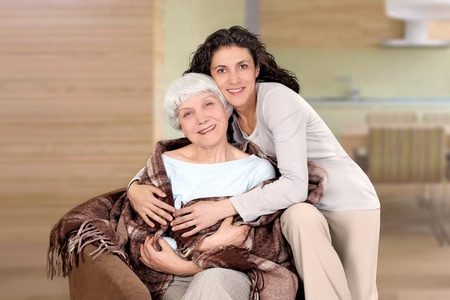
They may get along in the summer with just a daily “check-in” or two, but winter weather brings new challenges for the elderly.
With the arrival of colder weather we pull out the sweaters and gloves. We put up the storm windows and we make sure the snow shovel is where we can get to it. We weatherize the homes of our elderly loved ones too, and feel more confident that they will handle the frigid temperatures well. After all, they seem to get along in warm weather with just a “check-in” once or twice a day. The elderly, though, are less able to deal with cold weather rigors. That is especially true for those who have impaired abilities.
Because we lose the ability to maintain a normal internal body temperature as we age, the elderly may need more insulation in the form of layers of clothing and even keeping the thermostat higher. This is complicated, according to the American Heart Association, because older people seem relatively insensitive to moderate cold. They may not dress warmly enough because they don’t feel cold. If an impaired elderly person went for a walk in cold weather, for instance, they might not know that they had hypothermia before they were in danger. Frostbite can occur in minutes.
Another warning about those healthy “constitutionals” in cold weather: just being outside in cold weather can exasperate heart problems. That is compounded if the person decides to sweep off a walk or shovel a driveway. The elderly are more at risk of falling on icy walks as well, and even if they don’t break a bone, they may lie unnoticed for some time.
Colds and flu are more prevalent in winter. Pneumonia is one of the worst enemies of the elderly. Well-meaning friends dropping by can unleash a host of germs and viruses.
Winter weather is often accompanied by SAD, or seasonal affective disorder. In other words, some people get depressed in the winter more than in other times of year. This is often attributed to shorter periods of sunlight that we need to maintain emotional and physical health. Sunlight also affects the production of vitamin D. That vitamin is vital for a number of body processes, including preventing osteoporosis. Unfortunately, as we age our bodies become less efficient at producing the vitamin from sunlight, and especially when it is limited.
Of course, there are measures we can take to deal with the colder weather. We dress in layers, we wash our hands more often, we take vitamins and we arrange to keep our walks ice-free. Perhaps your loved one is still able to address the cold weather risks and savvy enough to get help when she needs it. If you have been wondering if she needs assistance, however, this may be the time to consider senior care at home.
For ideas on how to safeguard elderly loved ones this winter, or for questions about in home senior care, contact us. We can help.


